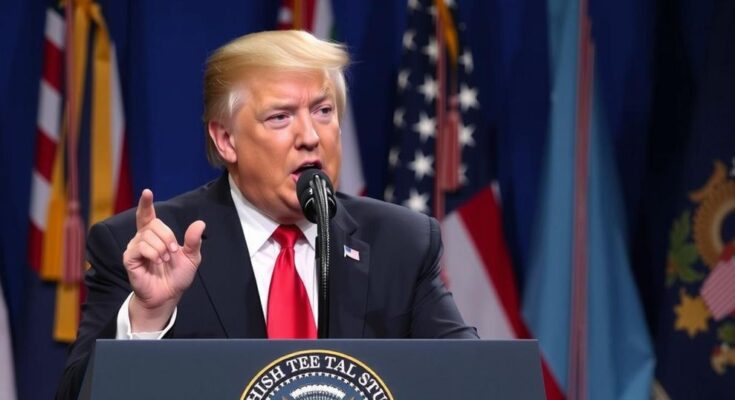In a recent press conference, President-elect Donald Trump addressed his views on NATO and Ukraine, the Israeli-Palestinian conflict, and territorial claims over Greenland and the Panama Canal. He criticized NATO spending, suggested economic pressure on Canada, and hinted at military options for U.S. interests abroad. Trump’s remarks provoked strong reactions from leaders around the world.
During a recent press conference at Mar-a-Lago, President-elect Donald Trump outlined several contentious aspects of his foreign policy agenda. He expressed opposition to Ukraine joining NATO, suggesting that the situation aligns with Russia’s long-standing position on the matter. He also reiterated his criticism of NATO members regarding military spending, demanding an increase to 5 percent of GDP. Trump’s comments on Israel and Hamas hinted at unchecked violence if negotiations do not progress, while he provocatively suggested economic pressure on Canada and potential military actions over Greenland and the Panama Canal, which met swift denunciations from leaders in those nations.
In references to NATO, Trump has expressed empathy towards Russia’s viewpoint on Ukraine’s NATO prospects, asserting that Russian leaders have historically deemed NATO’s involvement unacceptable. He stated, “A big part of the problem is, Russia… said, ‘You could never have NATO involved with Ukraine.’ Now, they’ve said that. That’s been, like, written in stone.” Additionally, his call for a mandatory defense spending increase to 5 percent indicates a staunch approach to military alliances.
On the Israeli-Palestinian conflict, Trump warned that serious consequences would ensue if a resolution regarding the release of hostages by Hamas was not reached promptly. Furthermore, he remarked ambiguously about future U.S. military strategy in Syria, indicating he would withhold specific information.
Trump’s rhetoric concerning Canada and Greenland further stirred controversy. He posited the idea of utilizing economic action to influence Canadian policy and refrained from excluding military implications regarding territorial claims over Greenland, which he deemed essential for national security purposes. His remarks elicited immediate backlash from Canadian Prime Minister Justin Trudeau, who asserted, “There isn’t a snowball’s chance in hell that Canada would become part of the United States.”
Moreover, Trump asserted that he would not dismiss military options concerning U.S. interests in the Panama Canal, emphasizing its strategic significance. This perspective encountered swift rejection from Panama, which underscored its sovereignty over the canal. Foreign Minister Javier Martinez-Acha asserted, “The sovereignty of our canal is non-negotiable,” firmly reestablishing the Panamanian ownership of the strategic waterway. France also issued a cautionary note, emphasizing that threats to European Union borders would not be tolerated.
Overall, President-elect Trump’s press conference illustrated his unyielding stance on pivotal international issues, which may reshape U.S. engagements abroad as he prepares to assume office. The reactions from global leaders indicate widespread concern over his proposed policies and their potential implications on international relations and stability.
The press conference held by President-elect Donald Trump served as a platform for expressing his foreign policy priorities ahead of taking office. Trump’s administration stands out due to its divisive rhetoric and unconventional approaches, particularly regarding alliances like NATO, regional conflicts, and territorial discussions involving neighboring countries. The context surrounding NATO’s role in Eastern Europe, the complexities of the Middle Eastern crisis, and historical U.S. interests in territories like Greenland and the Panama Canal provides critical insight into the implications of Trump’s foreign policy assertions. These comments raised alarms among international leaders, reflecting urgent concerns about the future of diplomatic relations as Trump signals a potential departure from traditional foreign policy norms.
Trump’s recent statements during his press conference have elicited significant scrutiny both domestically and internationally. His views on NATO integration for Ukraine, aggressive military posturing regarding Greenland, and economic strategies towards Canada challenge conventional diplomatic practices. The immediate backlash from global leaders emphasizes the unpredictability of Trump’s potential approach to foreign affairs, leaving many to question the future trajectory of American involvement on the international stage.
Original Source: www.aljazeera.com




